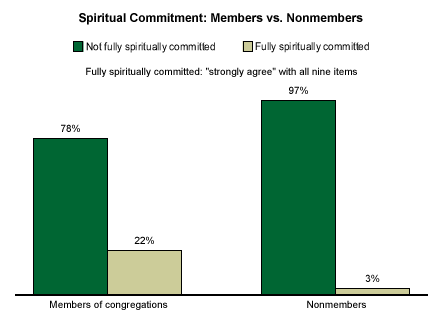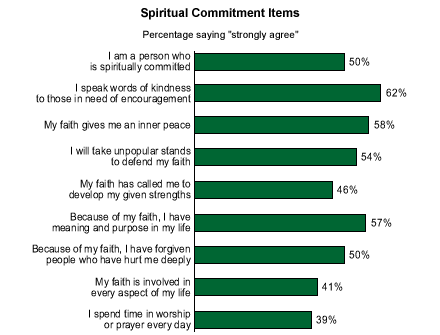For the past four years, Gallup has surveyed members of U.S. religious communities to determine their level of engagement with their congregations, and their individual level of spiritual commitment. In 2002, Gallup began including nonmembers (Americans who don't belong to a religious congregation) in the survey, so that comparisons could be made between members and nonmembers.
Not surprisingly, the 2002 data* showed a significant gap between the percentages of members and nonmembers who are fully spiritually committed -- meaning they "strongly agree" with each of the nine items that Gallup has determined best measure spiritual commitment:
- I spend time in worship or prayer every day.
- My faith is involved in every aspect of my life.
- Because of my faith, I have forgiven people who have hurt me deeply.
- Because of my faith, I have meaning and purpose in my life.
- My faith has called me to develop my given strengths.
- I will take unpopular stands to defend my faith.
- My faith gives me an inner peace.
- I speak words of kindness to those in need of encouragement.
- I am a person who is spiritually committed.
Nineteen percent of congregation members were fully spiritually committed in 2002, compared with 5% of nonmembers. That gap shows no sign of narrowing; in the October 2004** survey, 22% of congregation members are fully spiritually committed and only 3% of nonmembers fall into that category.

Spiritual Commitment Items: Highs and Lows
The nine spiritual commitment items measure both behaviors and attitudes. The item that has the highest "strongly agree" percentage among all Americans is, "I speak words of kindness to those in need of encouragement." Sixty-two percent of Americans strongly agree with this statement, suggesting most Americans are compassionate toward others having trouble in their lives.
At the other end of the spectrum, only 39% of Americans strongly agree that they "spend time in worship or prayer every day." While more than 90% of Americans consistently tell Gallup they believe in God or a higher power, a much smaller percentage set aside time each day to communicate with that higher power.

Bottom Line
These data suggest a possible disconnect between faith and practice for some Americans. But there are signs that Americans' spiritual commitment level does have some depth: In addition to the strong numbers in the area of compassion, 50% of Americans strongly agree that because of their faith they have forgiven those who have hurt them deeply, and 57% strongly agree that their faith gives their lives meaning and purpose.
*Results are based on telephone interviews with 1,000 adult members of a church, synagogue, or other religious faith community, aged 18 and older, and 500 nonmembers, conducted in November and December 2002. For results based on this sample, one can say with 95% confidence that the margin of sampling error is ±2.6 percentage points.
** Results are based on telephone interviews with 1,000 adult members of a church, synagogue, or other religious faith community, aged 18 and older, and 500 nonmembers, conducted in October 2004. For results based on this sample, one can say with 95% confidence that the margin of sampling error is ±2.6 percentage points.
